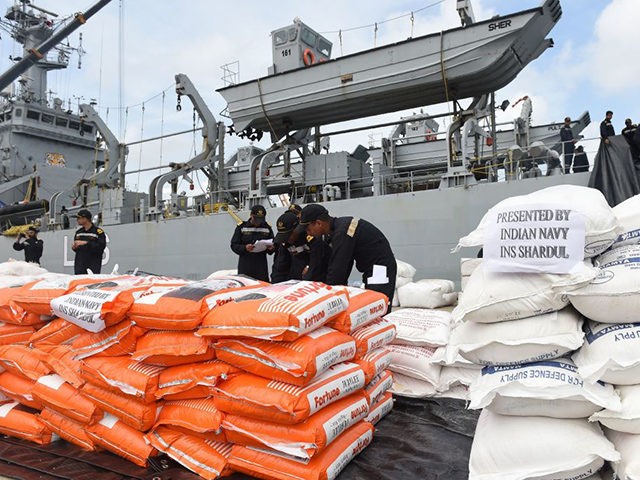Port workers in the Sri Lankan capital of Colombo staged a protest Tuesday, complaining that Chinese workers are allowed to work while locals are told that Chinese coronavirus restrictions make it impossible for them to do so.
Under the growing influence of the Rajapaksa family — cemented in this month’s election victory for President Gotabaya Rajapaksa and his brother, Prime Minister Mahinda Rajapaksa — Sri Lanka has become one of the world’s most eager participants in China’s Belt and Road Initiative (BRI). The BRI offers predatory loans to developing countries which they then use to pay Chinese workers to built infrastructure projects. When they can no longer make loan payments, China seizes pivotal assets on the ground.
Sri Lanka lost control of its key Hambantota port in 2017 over failure to make payments to China on its BRI loan. China is set to give the port back 99 years from the agreement, meaning Sri Lanka has 96 years to go.
In Colombo, workers desperate to feed their families protested that their employers have banned them from working because of the pandemic since March 20. Colombo Port City is currently a gated construction site, planned to become a lucrative real estate development center. The developer tasked to the project, which has not allowed the workers back on site, is the China Harbour Company.
The workers complained that many had been working reliably and competently on building the project for three years before suddenly being banned from their workplaces.
Sri Lanka, an island nation of slightly under 22 million people, has documented 2,880 cases of Chinese coronavirus at press time and only 11 deaths. It has not implemented any severe lockdowns, holding an election last week and opening schools this week. The workers, however, remain banned from their construction site.
Adding insult to injury, the workers say they regularly see ethnic Han Chinese people entering the Port City project and working construction — the jobs they say belong to them.
“They kept these gates closed restricting the employees while the Chinese freely roam,” Kanishka Heshan, one of the protesters, told Sri Lanka’s News 1st.
Others noted that the government had stated they would offer workers a minimum wage salary while they could not work, but they had not received them. Reports differed on the amount. One Sri Lankan publication claimed that workers expected payments of 5,000 Sri Lankan rupees (about $27) as a regular allowance while the pandemic crisis continued, but that they had not received the money. Others reported that the government had actually offered 14,500 rupees ($79.28) but that the Chinese Harbour Company paid them only the $27 instead.
Many expressed outrage towards China.
“Is Port City a colony of China?” one of the posters held up by a protester read.
Another, which News 1st identified as Nishan Munasinghe, expressed himself similarly: “Has this been taken over by the Chinese? There are plenty of people who are suffering because of this.”
The local site Lanka News Web quoted members of Sri Lanka’s Labor Department who said that they had attempted to reach out to the China Harbour Company about paying the workers but had failed to receive a response.
The overwhelming victory of the Rajapaksa family’s Sri Lanka People’s Front (SLPP) in last week’s election bodes ill for workers seeing less Chinese influence in their country. Gotabaya Rajapaksa has been president of the country since November, winning decisively as many blamed predecessor Maithripala Sirisena for failing to prevent the mass killing of over 200 Christians in churches throughout the greater Colombo area on Easter that year.
The Easter bombing occurred at a time of severe political turmoil in the country triggered by Sirisena attempting to replace his prime minister, Ranil Wickremesinghe, with Mahinda Rajapaksa, in a manner Wickremesinghe’s supporters deemed unconstitutional.
Last week, Sirisena lent his support to the SLPP and Mahinda Rajapaksa returned as prime minister, while four other Rajapaksas joined the nation’s Parliament. The SLPP currently controls 145 of the parliament’s 225 seats.
All the aforementioned players were pivotal to Sri Lanka’s involvement with BRI. Wickremesinghe was prime minister in 2002 under an SLPP president, when Sri Lanka agreed to allow China to build to Port of Hambantota, which it lost to China in 2017. Mahinda Rajapaksa succeeded him in 2004.
Under Sirisena, Sri Lanka responded to the loss of Hambantota by signing more BRI contracts worth over $50 million, despite the fact that it could not pay back the original loan it took out nearly two decades prior.
In 2018, the New York Times claimed to have seen evidence that the China Harbor company flooded bank accounts associated with Mahinda Rajapaksa with $7.6 million in campaign funds.
The Chinese state-run broadcaster CGTN celebrated the results of last week’s elections, asserting that the Rajapaksas’ dominance in the election “bodes well for Sri Lanka’s indomitable relationship with China which is based on trust, good will and strategic convergence.”
“Prior to the election results, Western analysts had pointed to the previous Rajapaksa presidency from 2005 to 2015, as pursuing a dangerous tilt towards Beijing with concerns of sovereign debt and China’s alleged disregard for Sri Lanka’s human rights abuses being points of concern,” CGTN admitted. “This mantra however, fails to account for the nuances characterizing the Chinese-Sri Lankan relationship which was strengthened considerably during the stated time frame.”

COMMENTS
Please let us know if you're having issues with commenting.